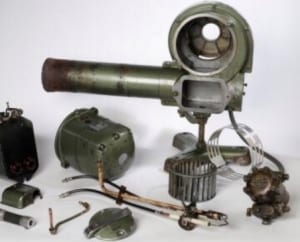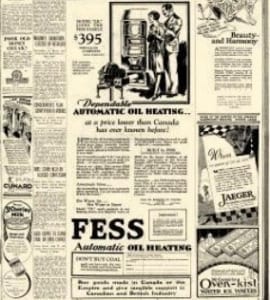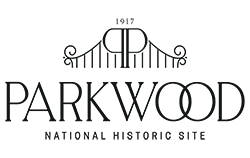One of my curatorial delights about Parkwood is the rare fact that we still find items of the past within, or on the estate grounds, every day. Part of this is due to the fact that as a home, Parkwood transferred to become a museum, with people still working at the Estate between January 1972, when RSM died, and the June 1972, when we opened as a public space, a museum, and event space, originally under hospital ownership. There was no closure period, and because of this, we have been graced with many things being left “intact”. Those who have taken my servants’ programs will recall my frustration about certain things being destroyed before public consumption of the Estate and McLaughlin stories, the laundry facilities, for example, but beyond some of these large scale changes, we genuinely are incredibly lucky about the material culture left behind, as I segue to our latest find.
Several weeks ago, Alorah and I, were snooping through the maintenance workshop. This basement space was the workshop space during the McLaughlin Family occupancy and continues as our workshop today. I marvel at the coffee tins and Sucrets™ lozenge boxes filled with handyperson doodads and bric-a-brac. We didn’t know what we were looking for, but we knew a treasure, or three hundred, awaited us. I have been in the series of custom built cabinets in this space frequently, but this time, a label caught my eye, nailed on the inside of one of the cabinets with small finishing nails, a notice from the Fess Oil Burners of Canada, Toronto, printed on it IMPORTANT-KEEP THIS CARD FOR FUTURE REFERENCE
The card reads that the Martin Brothers will be the sales and service representative for the oil burners at Parkwood and all customers “owing to the demand on our manufacturing facilities from the standpoint of war production”.
 Parkwood was originally heated through hot water boilers fueled by coal, fed to the radiators throughout the mansion. At some point, prior to 1939, the Estate converted to oil from coal, although it seems the Parkwood conversion predates most of Canada’s conversion, and “the eventual market dominance of oil when the high-pressure, fuel atomizing, gun-style conversion oil burner” arrived thanks to Fess Oil, photo left. (disassembled gun-style conversion oil burner)
Parkwood was originally heated through hot water boilers fueled by coal, fed to the radiators throughout the mansion. At some point, prior to 1939, the Estate converted to oil from coal, although it seems the Parkwood conversion predates most of Canada’s conversion, and “the eventual market dominance of oil when the high-pressure, fuel atomizing, gun-style conversion oil burner” arrived thanks to Fess Oil, photo left. (disassembled gun-style conversion oil burner)
War production would have consumed much of Sam McLaughlin’s professional life and waking moments from 1939 to 1945, but I had never considered the implications beyond rationing, and the loss of some of the male staff from the Estate, and family members, to the armed forces, and this notice was a reminder of how other aspects of Parkwood would have been impacted by World War II.
“Warming Up” Virtual Museum of Canada


